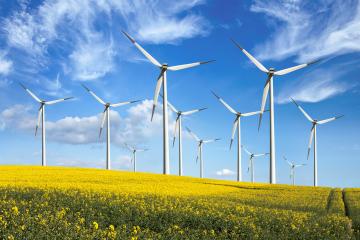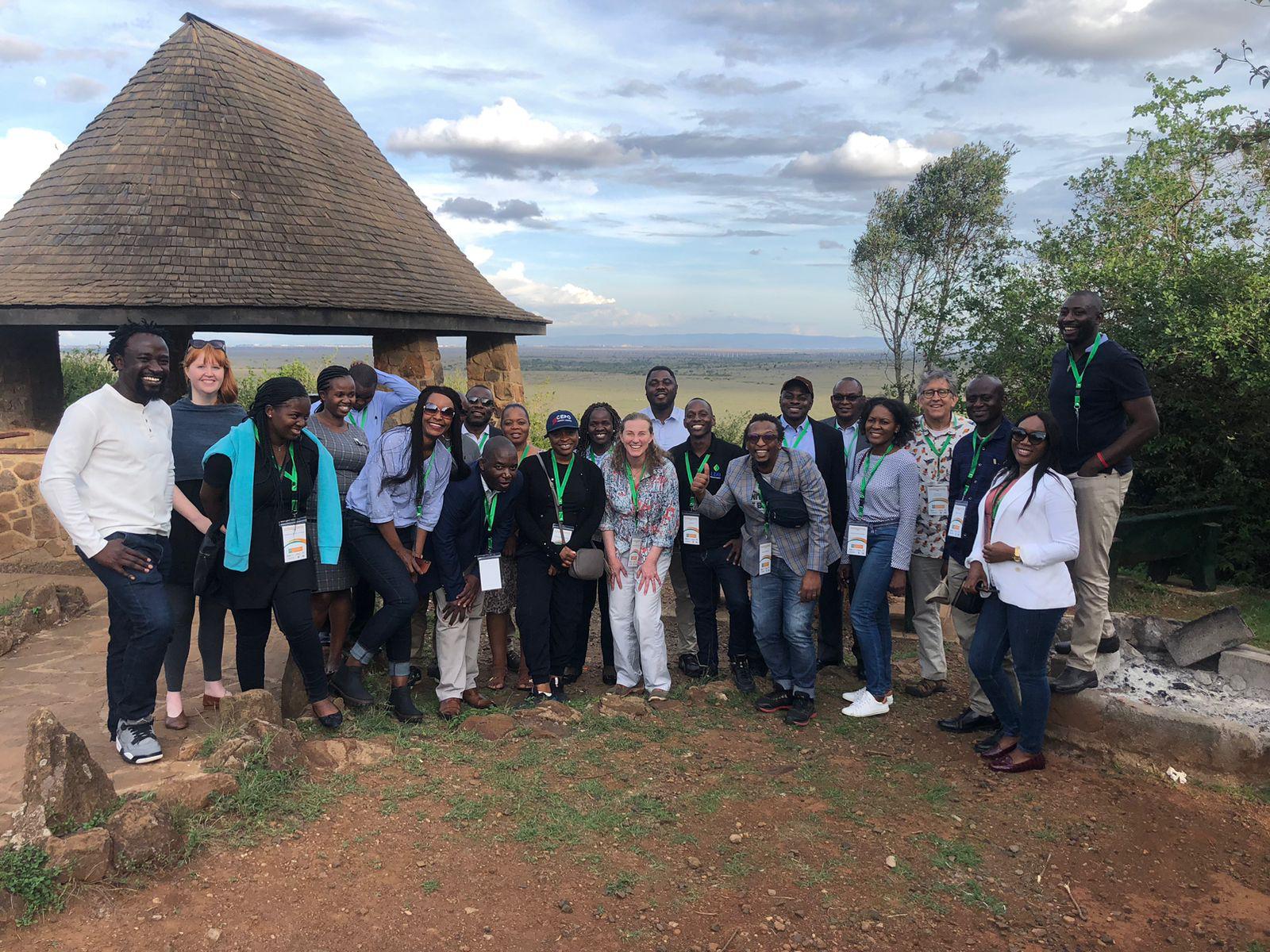
The Green Growth Knowledge Partnership’s Green Policy Platform brings together a global community of policy professionals and organizations working towards the transition to a just, inclusive green economy.
2022 was a year of growth and transition for the Green Growth Knowledge Partnership (GGKP) as long-term programmes came to an end and the foundations of new ones were laid. However, from facilitating major international workshops to building new partnerships, the core has remained the same: generating, managing and sharing relevant knowledge to a global community and bringing together key stakeholders to tackle emerging and complex issues within the green economic transition.
Over the last year, the Green Policy Platform has pushed forward the knowledge frontier on nature-positive economies, strengthened its regional work in Africa, been on the forefront of mainstreaming natural capital in finance, and begun to focus on tackling the third pillar of the triple planetary crisis – pollution.
An evolving partnership for nature-positive economies
The Economics for Nature initiative brought together key leading organizations working in the policy, economic, industry and advocacy sectors to mainstream natural capital and the value of nature into decision-making. After six years of partnership, the initiative ended in October 2022.
To close out its last year, the partners – GGKP together with the Green Economy Coalition, Capitals Coalition and World Wide Fund for Nature (WWF) France – jointly organized the week-long, hybrid Africa Green Economy Conference in June, brought together leading experts for a final conversation on Nature-Positive Economies: The Next Frontiers, and reflected on the past six years of collaboration and exploration.
“The Economics for Nature initiative has been transformative. With our partners we brought together stakeholders across the entire economic system to mainstream natural capital into green growth,” said John Maughan, acting Coordinator of the GGKP Secretariat. “In the last six years, this work has accelerated greatly. With the recent decision by parties to the CBD, and nature beginning to take on a greater role in economic planning from the local to global level, we look forward to continuing to forge ahead in the transition to nature-positive economic systems.”

The 2022 Africa Green Economy Conference, which took place on 27-30 June 2022, brought together over 250 participants from across Africa and the world to discuss how investing in nature and better valuing Africa’s natural capital assets in public policy could help the continent transition to a nature-positive economy. Four country-level sessions led by local partners in Gabon, Mozambique, South Africa and Uganda were held in between the high-level opening and closing plenaries. During the conference, the East Africa Green Economy Hub and Green Forum Africa Green Economy Community Group were launched, and stakeholders in Mozambique engaged in a discussion on how to integrate natural capital in infrastructure finance. Discussions at both national and regional levels helped build momentum around the transition to nature-positive economies in Africa and the important role of natural capital.
Though the Economics for Nature initiative is over, the knowledge generated and the partnerships forged during it live on and are ready to address the challenges of creating nature-positive economies:
-
The GGKP Expert Group on Natural Capital produced 14 reports during its tenure, with more to come in 2023, and exchange between the experts ongoing.
-
The Natural Capital for African Development Finance (NC4-ADF) initiative is a collaboration led by GGKP and the African Development Bank (AfDB) in partnership with WWF; it generated use cases of natural capital in infrastructure finance, helped build the capacity of public financiers and demonstrated the importance of nature-positive investments such as nature-based solutions.
-
The Natural Capital for Sustainable Development Goals emerged as a core workstream, with a new methodology produced and country pilot projects undertaken with the Economics for Land Degradation Initiative in India, Kyrgyzstan and Rwanda, with more forthcoming from Cameroon, Mauritania and Nigeria, as well as two new reports assessing the natural capital gap globally and at a regional level in Africa.
-
The 3Returns Framework was developed with the Global Green Growth Institute (GGGI) to assist with sustainable landscape interventions and continues to be used for country assessments.
Learn more
Green growth for a green recovery
How to recover from COVID-19, and any unexpected shock, in a sustainable, just, green way has been a large focus of the environmental and economic policy communities the last few years. Assessing this concern from a regional perspective, GGKP partnered with AfDB, WWF Africa, the African Union Commission and the UNFCCC Regional Collaboration Centre to put on a series of webinars on Mainstreaming Natural Capital in Africa’s Post-COVID Development Agenda.
Building on the African Union Green Recovery Action Plan featured in the first session, the second webinar in March 2022 focused on resource mobilization, highlighting the necessity of scaled collaboration between development finance institutions as well as evidence-based finance plans for a just transition towards green recovery. The latest webinar in September 2022 focused on better leveraging natural capital for green jobs as countries pursue a green recovery. The ability to populate green jobs while empowering women and youth is a critical co-benefit of natural capital that can help pave the way toward a green economic transition. Drawing from these insights, the upcoming final webinar in early 2023 will summarize these different topics and catalyse a discussion on the ways to materialise a structural green recovery beyond short-term stimulus measures.
“Countries find themselves at a critical juncture as they must choose a path to recover,” said Stephen Cornelius, Deputy Global Leader of Climate & Energy at WWF. “There is now an opportunity to build back better. Nurturing ecological capital will be key to future development.”
In June, Partners for Inclusive Green Economy, of which GGKP is a member, published a discussion paper for governments and policymakers outlining an aspirational green recovery agenda and key recommendations. Additionally, GGKP put in place a framework for a Green Recovery Hub, to be fully launched in 2023, that will serve as a repository for green recovery knowledge, platforms and insights.
Learn more
Financing nature action
An emerging area of importance, intersecting discussions around green recovery, natural capital and climate finance, is the focus on investing in nature to address environmental and development challenges. Finance was a core issue area at every major event this year, from Stockholm+50 and Africa Climate Week to UNFCCC COP27 and UN CBD COP15.

The NC4-ADF partners moved this conversation on integrating natural capital into the design, operations and dialogues of development finance in Africa even further by releasing multiple reports and organizing events and workshops throughout 2022. While the initial seed funding to build a foundation for mainstreaming natural capital, specifically within the AfDB, has come to an end, interest remains high among partners. The work under NC4-ADF helped place natural capital as one of core pillars of the upcoming strategy for AfDB’s African Natural Resources Management and Investment Centre. The initiative also centred nature-based solutions as a multi-beneficial solution for development finance in the region.
-
Maputo, 29 June, National Dialogue on Natural Capital for a Green Economy in Mozambique
-
Nairobi, 5 October, Addressing the Barriers to NBS Adaptation for Climate, Water and Biodiversity
-
Maputo, 27-28 October, Enhancing Capacity on Natural Capital Approaches for a Green Economy
-
Nairobi, 5-8 December, Regional Training Workshop: Natural Capital Approaches for a Green Economy in Africa
“There are opportunities emerging to finance biodiversity at scale at country level. We see the increasing importance of investing in green solutions which prioritize nature. Going forward, to be more effective, we need to be more joined up in our thinking and practice and bring all sectors together,” said Dr Vanessa Ushie, Acting Director of the African Natural Resources Management and Investment Centre of the AfDB.
Learn more
-
Nature-Based Solutions in Sub-Saharan Africa for Climate and Water Resilience
-
A Sustainable Asset Valuation of the Kakono Hydropower Plant in Tanzania
GGKP on the global stage
GGKP supported and participated in many key international events in 2022.
Stockholm+50, marking 50 years of UNEP, was a major moment for the environmental policy community and GGKP. In the lead up to the event in June 2022, GGKP created an online community space, curated a blog series, held a series of high-level webinars, facilitated virtual informal working groups, and capped it off with an official side-event by and formal launch of the GGKP Gender Expert Group.
Gender equality is recognized as a prerequisite for attaining sustainable development. Yet, gender inequalities are found in all societies with respect to political, economic and social opportunities. The GGKP Gender Expert Group’s purpose is to catalyse collective action towards gender equality through collaboration among the leading policy, industry and finance green growth experts. GGKP also mainstreams gender equality in all its activities and projects.
GGKP’s other co-hosting organization, GGGI, held its annual Global Green Growth Week in October 2022 and GGKP’s platforms and expert groups played a key role in three of the sessions, covering the themes of climate finance, gender just climate action, and knowledge sharing and capacity development for green growth.
Additionally, through collaboration with its partners, GGKP was involved in centring the global conversation around financing nature action during the conferences of parties of major multilateral environment agreements on climate change and biodiversity.
Learn more
-
Inclusive green economies: No just transition without gender equality
-
Gender-Responsive Sustainable Finance: Towards Inclusive Market Economies
Taking action on pollution
GGKP began entering a new phase of work in 2022. On 7 June, the GEF-funded ISLANDS Programme launched during the BRS Triple COP (Conferences of the Parties to the Basel, Rotterdam and Stockholm Conventions). Through the Implementing Sustainable Low and Non-chemical Development in Small Island Developing States (ISLANDS) Programme, 33 SIDS are taking significant steps towards a cleaner and safer environment through the sustainable management of hazardous chemicals and waste.
GGKP is executing the ISLANDS Coordination, Communication and Knowledge Management Child Project. Throughout the year, ISLANDS convened a number of capacity building webinars on Sustainable Financing for Waste Management, Mercury, Gender Equality and Plastics (Caribbean, Pacific),
During the past year, GGKP has also taken part in building a global partnership around the management and reduction of agrochemicals and agricultural plastics. Stay tuned for more news in 2023 on GGKP’s work tackling pollution.
